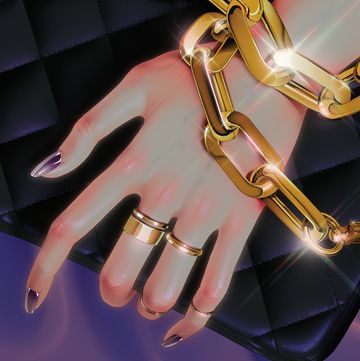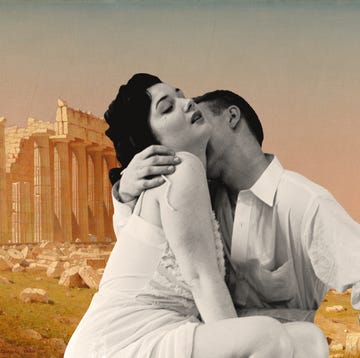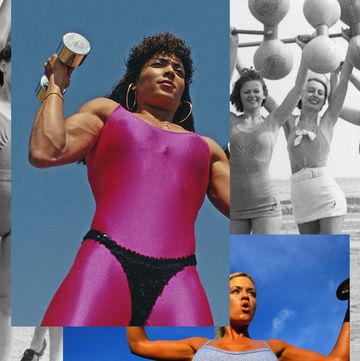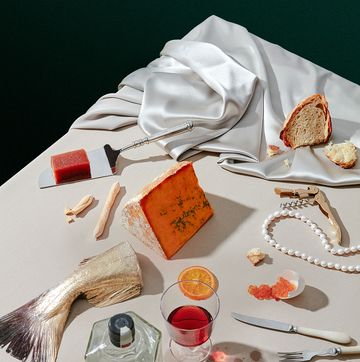Forty of America's wokest men are sitting in a circle on a mountaintop in Ojai, California. Many are wearing AllBirds and joggers, taking notes in their Moleskines. The only woman anyone notices is Esther Perel, the 60-year-old, sun-tanned couples’ therapist in jeans, a spaghetti strap top and platform sandals.
"Masculinity is often framed as a performance," Perel says. "All over the world, men go through multiple rituals and experience to 'prove' and 'test' their masculinity. Our culture thinks that we are born women and that we 'become' men."
The men snap and nod their heads in agreement. Welcome to the inaugural Women Teach Men weekend: a three-day men’s wellness retreat designed “to increase emotional literacy among men and create a community of men that can be better allies to each other and women,” according to founder, event producer and author Michael Hebb.
You only need to watch one episode of Queer Eye to see that heterosexual men are in trouble, henny. (Really, Tom, your favorite house chair is a stained petri dish of crusty farts and cheeto dust? Not okay.) But it’s not just reality TV contestants who seem to be struggling. Much has been written about the crisis of masculinity, and it goes way deeper than home décor. Shifting gender roles in a quickly changing world have left many men adrift, and the results have been harmful to themselves and those around them. At the same time, women have a new vocabulary for pinpointing sexism in relationships and at work. How should men navigate the new landscape of love and work in a post-#MeToo world?
This question was at the heart of Women Teach Men, an $895 July wellness retreat featuring talks, lectures and workshops taught by accomplished female experts. The speakers ranged from well-known media personalities like Perel to lesser-known gurus like "body poetess" Mari Sierra. In addition to talks, the weekend included structured men’s groups (no women allowed), where men could sit around and share their feelings—a.k.a. my sexual fantasy. When I found out all this was going down at the Ojai Valley Inn, a five-star hotel with a pool, mountain views and delicious gourmet meals, I packed a bag of bikinis faster than you can say, “The Patriarchy hurts men, too!”
Over 72 hours, I attended ten talks, drank eight glasses of rosé, interviewed seven men, and cried four times. It was a true whirlwind that left me thinking that women aren’t the only ones that need support and allyship.
At the first talk of the weekend, I found a room full of stylish, fit, and apparently sensitive men, most in their 30’s and 40’s. (Forget Bumble and Tinder, ya’ll! I found the husband hideout!) After the welcome orientation, we were herded to the outdoor terrace for a dinner of caprese salad, roasted veggies, and fresh fish.
As a bright orange sun melted behind the mountains, I began to question my dinner companions. What brought them to the retreat? In short, Esther Perel. The Belgian couples’ therapist is famous for her open-minded, European approach to desire and fidelity, which, evidently, resonates with men. A proctologist in his 50s came specifically to hear her speak. Ditto for a Tinder engineer in his 20s.
Other attendees came out of a broader ambition to be better men. James, a friendly sports coach said, “The title Women Teach Men kind of scared me and when something scares me it means I need to explore it.” Dallas, a 39-year-old from Salt Lake City, so gorgeous he made Jon Hamm look like a bowl of hummus, said that he was there to, “get greater clarity on what a healthy, honest expression of masculinity really is.” He looked like a pretty healthy expression of masculinity to me.
The next morning, in an airy room covered in fresh flower garlands, the charming TV writer Tracy McMillan gave us a crash course in relationships. After a few failed marriages, McMillan realized she had fallen into a trap of objectifying men. Obviously, I’ve never objectified a man in my life, collar tug. But it turns out McMillan wasn’t talking about thinking guys are hot.
McMillan explained that women objectify men by getting into a relationship because they want something from a man: a baby, a house, security, or financial stability. In this scenario, women are kind of using men. I’m paraphrasing here, but her point was that to have a meaningful romantic relationship your primary concern should be not what you can get from somebody, but what you can give to them and how you can both nurture and support each other. Food for thought.
Perel’s lecture was more of an interactive workshop. First, she had us make a pile of chairs in the middle of the room. Then she made us reorganize the chairs in a giant circle so that everyone faced one another. We scrambled to follow orders, barely beating the buzzer.
“This is what we need to do to our current thinking around gender roles,” Perel finally said. “We need to completely take it apart so we can rebuild it.”
Perel went on to explain that men have been conditioned to repress every emotion except for lust and anger. Then she opened up the floor for questions. Every male attendee, to a one, raised his hand.
“How do you forgive yourself for things you’ve done in the past that you’re ashamed of?” one shy bro asked.
Before Perel got through half the questions, it was time for another picturesque dinner. She offered to reconvene later—sans the handful of women in the audience—for a no-holds-barred Q&A.
My sources tell me this session went until one in the morning and covered everything from the nature of male aggression to the effects of watching porn. I caught up with Esther afterward. What stuck out to her wasn’t any one particular concern but just how starved the men were for a chance to talk and ask questions. “Women are over-served in the space of relationships and men are totally underserved,” Perel told me. “And because the lives of women will not change until men come along that means that men need to have a chance to also rethink what it means to be a man at home and at work.”
It turns out some men need permission to speak openly about what it means to be a man in the wake of #MeToo. A married rabbi said his favorite part of the weekend was when Perel lamented that in this current climate men are being told to sit down and shut up. The rabbi felt validated that a woman might want to hear his point of view. “If you’re not a predator and you are capable of speaking up then you should make your voice heard and be part of the solution,” he said.
A lot of the men I chatted with admitted to feeling vilified by the #MeToo movement. My imaginary boyfriend Dallas said that his favorite part of the weekend was feeling appreciated by the female speakers. “Because men have historically done so badly by women it’s difficult to be proud of who we are and what we have the ability to contribute,” he said. “A space like this is so unique because we can actually be applauded and appreciated in way that’s very meaningful.”
Over coffee the next morning, I grilled Perel on the question of man-bashing, which she had briefly touched on in her lecture. I have observed—and, why lie, participated in—certain gendered generalizations, usually over drinks with friends. Men are jerks; men are immature; men can’t commit—whatever. Until recently, these conversations felt inconsequential. Men Are from Mars, Women Are from Venus, we’re all trying to figure out how to get along. Now that there is a lot of justified anger towards men, and the generalizations feel serious.
Perel told me that in her native language, French, it's not easy to generalize an entire gender. One doesn’t say “all men” or “all women.” The phrase is “des hommes” and “des femmes” which translates to “some men” and “some women.”
She elaborated: “The same way that when a man treats a woman poorly we want another man to say ‘Drop it, this is not okay.’ When a woman starts bashing a guy, or guys as a whole, somebody has to step in and say, ‘Why are you saying this?”
I felt weepy and emotional often during the course of Women Teach Men. I teared up when men shared their insecurities during Perel’s lecture. I shed a couple wet ones when McMillan spoke about her difficult childhood. I even got sappy during a lecture about blockchain technology. I was so proud to see a female scientist school a room of dudes! But my best cry was during a conversation with Dan Doty, a lovely man who runs Evryman, a men’s wilderness retreat to encourage male bonding through hiking, hunting, talking and sharing.
Doty described growing up in a home where feelings were repressed. Even though he could tell that his parents were unhappy, nobody talked about it. “My dad was very honorable and loving but completely emotionally frozen,” he said.
This year, Doty’s dad came to one of his retreats for the first time and opened up in a way Doty had never seen. Fighting back tears, Doty said that, in one of the sharing circles, his father admitted that he had been suicidal for most of his adult life. “He told me he was scared and didn’t know how to be a good dad but how proud he was of us and how much he loved us.” Now we were both crying.
“That must have been nice to hear,” I offered.
“It was more than nice. It’s one of the biggest things that ever happened to me in my whole life. In some ways, this whole Evryman thing was designed for him.”
At this point, I was a bubbling snot volcano.
Later that night, I lay in my king-sized hotel bed (brag) and thought about my own dad. He definitely comes from the Don Draper school of masculinity and, though I love him, I never felt close to him. I've done a lot of work healing the hole in my heart where I was hoping his affection and attention would be. Because of the model of masculinity I was raised with, it was inspiring to be surrounded by men trying to become more emotionally present. They made me feel excited about the evolution of masculinity, and how it opens up the potential for deeper, more connected relationships.
Is an expensive, exclusive, three-day vacation going to change the culture of masculinity? I don’t have the answer, but I do have a great tan. I think most of the weekend’s speakers would tell you that real change is slow and has to start somewhere. Every time Tan France teaches a Trump supporter about the French tuck we make a little progress. Every time a man talks about his mental health in a sharing circle we make even more progress. The more we can talk about healthy masculinity and incorporate it into the mainstream conversation, the more men will have space to heal and become authentic. Driving away from Ojai, I left with a plush hotel bathrobe, a purse full of tiny soaps and a newfound empathy for “some men.”











